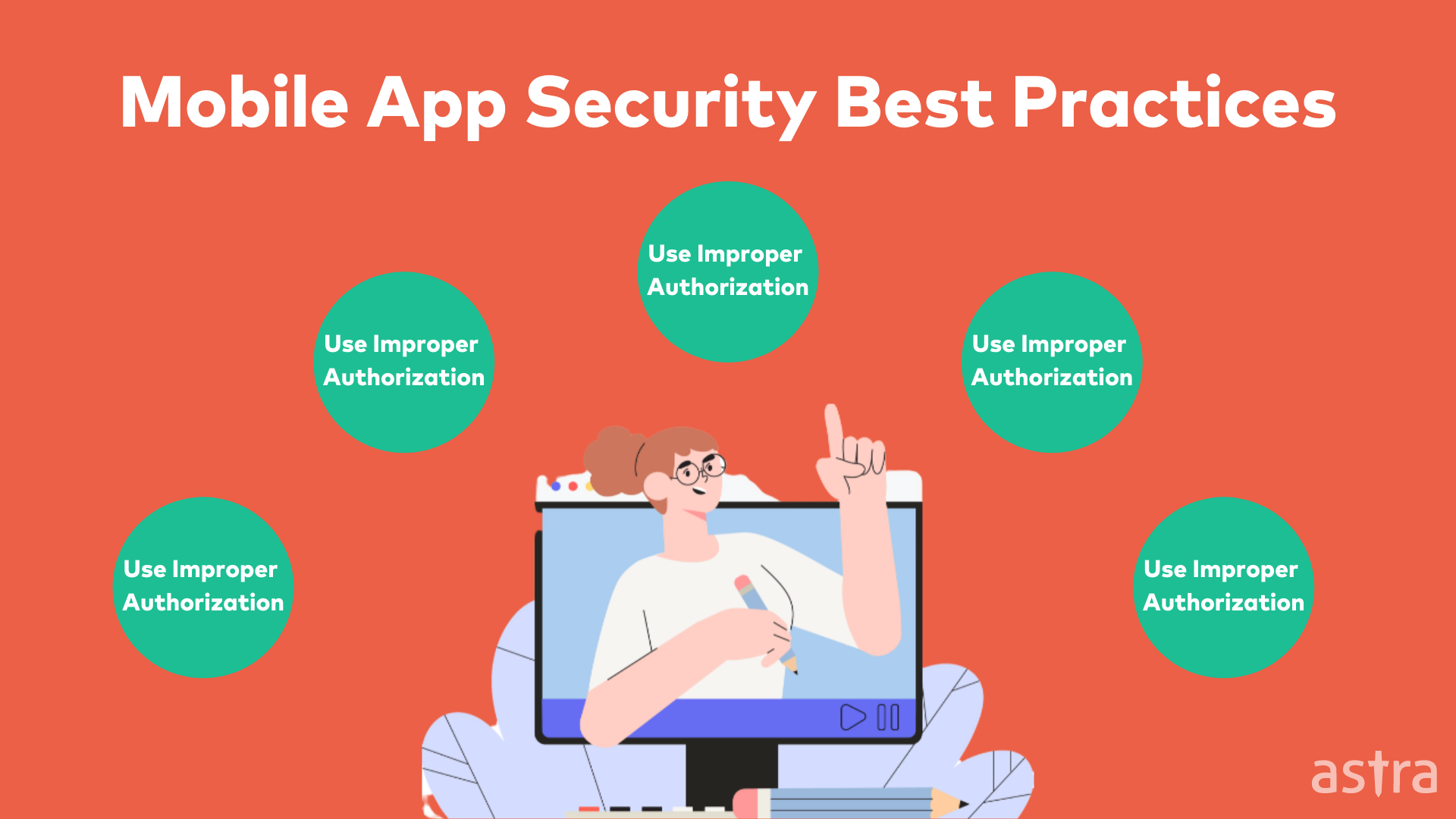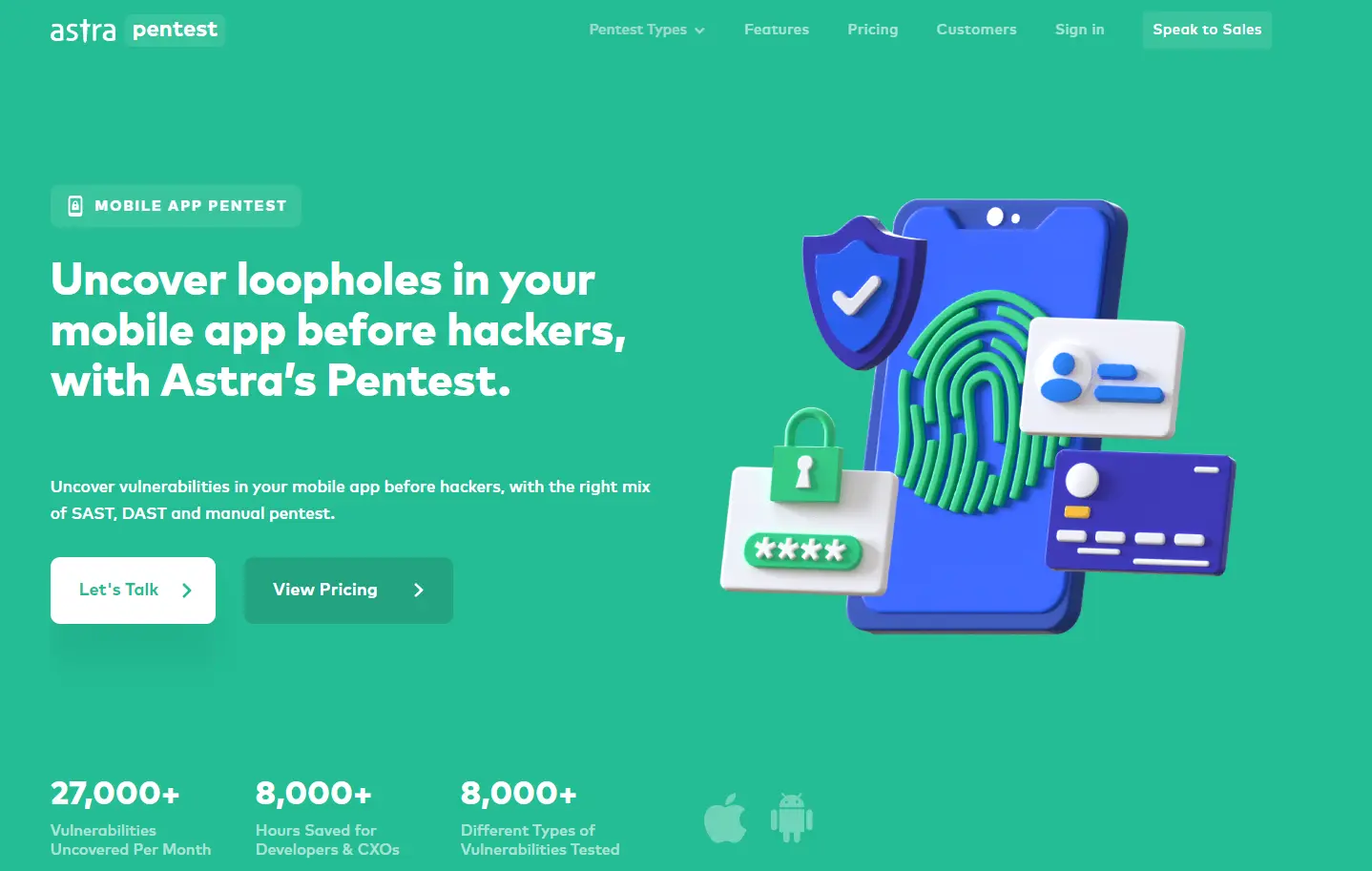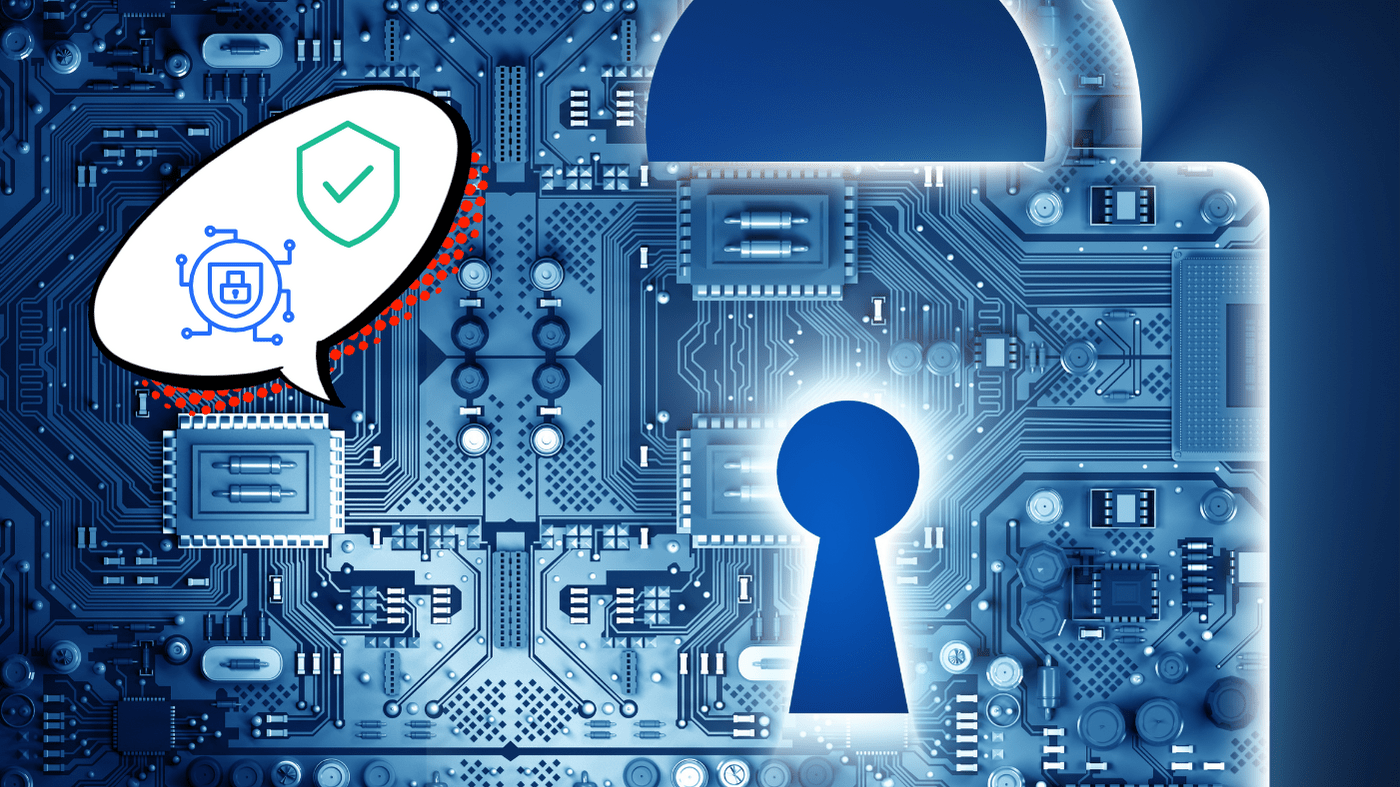Mobile apps now account for more digital activities than traditional desktop ones. 59% of active media consumption was accounted for in 2022 itself.
But here’s the deal: such apps have access to sensitive user information — making it essential that proper mobile app security measures are implemented for proper protection.
Sure, all major mobile platforms provide security options. But it is often up to the developer to choose the right ones. If not adequately screened, these can be easily exploited by attackers.
As such, in this blog, we will be discussing the following in detail:
- What is mobile app security?
- Best practices for mobile app security
- An overview of mobile app security standards
- Benefits of mobile app security
What is mobile app security?
Mobile application security is the sum total of all technologies and processes that protect mobile apps from cyberattacks and data theft. An all-in-one mobile app security framework can protect platforms such as iOS and Android by testing their security.
Mobile device usage has grown significantly in recent years, with approximately 90% of the global internet population using a mobile device to access the internet.
This provides many opportunities for cybercriminals to target unsuspecting users, making the need for endpoint security for mobile devices even more essential.

Best practices for mobile app security
Protect your mobile app against cyber threats. Take proactive steps whether you’re creating a new app or already have one in use. Here are four tips for securing your mobile applications:
Data Security
To protect customer data, companies must ensure their mobile app is secure. Without proper security measures, malicious actors can access customer info or even use the app to attack other systems. To maximize data security for businesses and customers, data encryption must be used.
For example: Secure Sockets Layer (SSL) or Transport Layer Security (TLS) encryption can be used while transferring data over the internet, while SQL databases can be kept safe using SQLCiper encryption methods.
User Authentication
User authentication helps protect applications against unauthorized access. Strong passwords and two-factor authentication strengthen this security measure. Implementing two-factor authentication (2FA) means that businesses can restrict malicious actors from accessing sensitive data or committing other damaging actions.
For example: Using biometrics combined with a unique password, such as fingerprint recognition or face ID on the phone, followed by a password or pattern unlocking action. This makes it harder for cybercriminals to gain unauthorized access to the mobile app.
Secure APIs
Mobile apps require Application Programming Interfaces (APIs) to communicate with their backend services. To guarantee that only authenticated users have access, encryption, token authentication, and other security measures should be implemented. This will protect against malicious actors.
For example: OAuth (Open Authorization) is commonly used for token authentication in APIs, providing secure access to backend services. You might also consider using a Hash-based Message Authentication Code (HMAC) for secure communication within the app.
Reduce Malware Threats
Implement security measures such as sandboxes, antivirus software, and intrusion detection systems to protect your mobile applications from malicious malware.
For example: Android OS offers a secure sandbox environment that separates apps’ data and code from other apps on the device. Additionally, antivirus companies provide specialized mobile security to detect mobile-specific threats. Lastly, Intrusion Detection Systems (IDS) monitor suspicious activity or violations on networks, providing another defense against malicious code.
Software Updates and Patches
Think continuously about improving your app’s security. Regular updates and patches, targeted at fixing vulnerabilities, can act effectively in keeping your app safe. Ensure to use of a secure coding practice, deploying strategies like code obfuscation and penetration testing, for identifying and patching software vulnerabilities on time.
For example: Android and iOS both release regular updates to give developers the chance to implement necessary security updates. Plus, employing automatic checks for outdated software versions helps maintain an up-to-date system with ever-evolving security measures.
Implementing these strategies can limit successful cyber-attacks and preserve user trust in your mobile app.
User experience is rooted in trust and security: if a user trusts their data is secure, they will happily and frequently use the app.
Consequently, mobile app developers must have knowledge of potential cyber threats and appropriate measures to protect against them. Effectively managing risk supports a secure mobile ecosystem that benefits end-users and businesses alike by keeping data secure.
Why is Astra Vulnerability Scanner the Best Scanner?
- Runs 8000+ tests with weekly updated scanner rules
- Scans behind the login page
- Scan results are vetted by security experts to ensure zero false positives
- Integrates with your CI/CD tools to help you establish DevSecOps
- A dynamic vulnerability management dashboard to manage, monitor, assign, and update vulnerabilities from one place.
- Helps you stay compliant with SOC2, ISO27001, PCI-DSS, HIPAA, etc.
- Integrates with Slack and Jira for better workflow management
- Trusted by the brands you trust like Agora, Spicejet, Muthoot, Dream11, etc.

Mobile app security standards
App threats and attacks are on the rise. And what secures the app against these threats? Adherence to set mobile app security standards, certainly, but there’s more to it.
Gartner estimates that the global market for information security will reach a market cap of $170.4 billion, emphasizing the need for advanced app security standards.
To identify code defects and vulnerabilities in mobile apps quickly, ensure you use tools based on leading industry standards such as OWASP, NIAP, CWE, and CVSS. Further, let’s explore these mobile app security standards to understand their role in app security.
OWASP Top 10 Mobile Threats
When choosing a mobile security testing tool, ensure it satisfies the OWASP Mobile Top 10 standards. Millions rely on OWASP Mobile Top 10 as a security baseline for mobile apps. It helps development teams find vulnerabilities during the SDLC, so they can build better code and limit security issues before launch. These security criteria cover everything from reverse engineering to authorization and data security. Any development team should make OWASP Mobile Top 10 part of their security checklist.
Common Vulnerability Scoring Systems (CVSS)
CVSS, short for Common Vulnerability Scoring Systems, is an industry standard for assessing the severity of application vulnerabilities. It produces a numerical score that reflects characteristics of the vulnerability, such as its potential harm and likelihood of exploitation. These scores are interpreted as categories like low, medium, or high and used by security teams to prioritize mitigation and bolster their vulnerability management procedures.
Common Weakness Enumeration (CWE)
CWE (Common Weakness Enumeration), sponsored and managed by US-CERT (US Department of Homeland Security program), is a list of security vulnerabilities used by most trusted mobile application security testing tools. This community-developed standard helps developers identify potential security flaws and choose the most suitable security tools and services to eradicate them.
National Information Assurance Partnerships (NIAP)
The U.S. government’s National Information Assurance Partnership (NIAP) ensures that its applications adhere to security standards and meet customer needs. It outlines security assessment guidelines and verifies that the applications pass risk evaluation criteria. Security tools that meet the program’s stringent standards are seen as the most reliable for security testing.
Internet of Secure Things Alliance (ioXt)
ioXt, the Internet of Secure Things Alliance, is a major security program focusing on security and regulation compliance for connected devices and their associated apps. With 300+ companies from various industries including Amazon and Facebook — ioXt provides security parameters for a variety of smart devices like smart speakers, lighting devices, webcams, etc., and their managing apps.
Benefits of mobile app security
Better protection against identity theft
Identity theft occurs when a person’s digital documents, such as social security numbers and passwords, are stolen. This information is often accessed through the victim’s mobile phone, by examining internal and cloud storage and using the phone number to bypass two-step verification.
Higher safety of banking information
Apps providing access to goods and services often store customers’ sensitive information, like credit card numbers, shipping addresses, and order details. These apps may put this data at risk if they have security flaws. Quality Assurance can reduce such threats.
Enhanced privacy of personal media and messages
Mobile devices store personal photos and videos, which can be accessed from the cloud. If this media falls into the wrong hands, it can be used maliciously — for blackmail or to embarrass an individual. Secure mobile apps encrypt messages and keep media files hidden from outsiders.
Improved resistance to massive infrastructure breaches
Online data breaches have exposed billions of records, which criminals buy from the dark net for targeted attacks. Companies need software updates and security standards to minimize the risk of data leakage.
Increased protection against hardware hijacking
Mobile devices are now equipped with advanced AI capabilities and sensors, making them suitable for remote control and monitoring.
They are able to record audio and video, as well as sense environmental data and geolocation.
Moreover, infected devices can be used in botnets to commit cybercrimes such as spamming and DDoS attacks. Although cryptocurrency mining on smartphones and tablets has been on the decrease, it is still a potential risk.
To lessen this risk, mobile app security needs to be able to identify malicious files and links, and alert users.
How can Astra help?
Mobile app security can be quite a complex undertaking. As such, investing in a stringent and comprehensive mobile app security program can keep your data safe, protect your customers, and enjoy a reputation as a company that gives utmost importance to user privacy.

Astra’s Scanner is constantly updated to detect the latest vulnerabilities and can currently run 8000+ tests for the same. The scanner checks for payment manipulation and business logic errors and can scan behind logins. Moreover, vetted scans and manual pentests help ensure zero false positives, while the AI-powered chatbot and human support help provide round-the-clock support.
Conclusion
Despite advances in mobile security measures, mobile phone users are prone to cyber threats. Malware attacks, data leakage, unsafe third-party APIs, insecure authentication, poor encryption, unpatched vulnerabilities, rooting/jailbreaking, insecure network connections, overprivileged apps, and insecure third-party components — all make up the web of mobile app security threats.
The above-stated best practices and compliance with mobile app security standards such as OWASP Top 10 Mobile can help secure your application significantly. For more information, visit www.getastra.com.
FAQs
How does mobile app security work?
Application security controls refer to measures taken at the coding level to strengthen an application against cyber threats. These controls ensure the correct handling of unexpected inputs that an attacker may use to access an application’s vulnerabilities.
What is the most important aspect of mobile app security?
Developers and users should both be knowledgeable of mobile application security measures to protect their information. Encryption, authorization, user authentication, input validation, code review, secure communication, testing, and regular updates — all are essential.
















